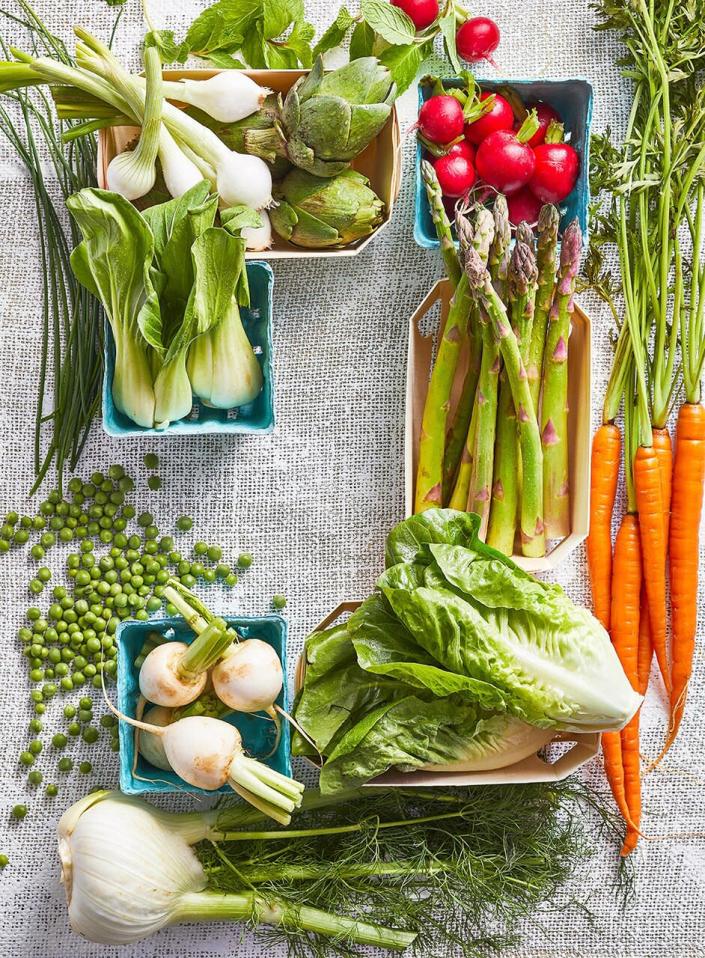[ad_1]
Crisp lettuce, juicy tomato, creamy avocado—nothing really compares to a good meal made with fresh, seasonal ingredients. But you shouldn’t always rely on what the grocery store has on its shelves to supply that for you. Produce that’s in season varies by state and month, and it can be a challenge to know when to hunt down certain fruits and veggies while shopping for your next nutritious dinner. This guide takes care of that for you—plus, get tips from a farmers’ market vendor on eating seasonally, picking your produce, and why buying local is best.

Carson Downing
What is in-season produce?
According to the Seasonal Food Guide, “seasonal food is produce that is purchased and consumed around the time that it’s harvested.” Eating seasonally provides you with food that’s tastier and more nutritious, especially if it’s bought from a local grower or farmer. It won’t spend days on the road traveling to its final destination (aka your local commercial grocery store), and they don’t need to be picked early to be shipped and distributed.
“The difference between buying at the grocery store and buying at a farmers’ market is you get the best flavor,” says Rick Dominguez, the owner of Rick’s Produce in Los Angeles (also a vendor at the Original Farmers Market LA). “You’re gonna enjoy it, and you’re gonna know what you’re buying. You’re gonna look forward to getting that produce because the farmer [at the market] just told you all about it.”
The benefits of buying produce seasonally and locally
At most farmers’ markets, Rick says, the owners of the farm sell their produce themselves (and vendors must receive certification by the U.S. Department of Agriculture). This allows them to form relationships with their customers—something you don’t usually get at a grocery store. Plus, the seasonality of produce depends on where you live, so having a connection to a local farmer is essential to keep track. They can also give you all the details on a fruit or vegetable you may not be familiar with, and you know where it came from.
“They can tell you exactly what it is, what you can do with it, recipes—at a grocery store… you have to learn on your own,” Rick says.

Carson Downing
In-Season Produce Guide
While seasonality does vary based on location, you can generally reference this guide at any time of year to find out what produce to pick up the next time you grocery shop. (For more specific information, check out the U.S. Department of Agriculture Seasonal Produce Guide to figure out what’s in season near you.)
Spring
-
Asparagus
-
Avocados
-
Broccoli
-
Collard greens
-
Kale
-
Kiwi
-
Lettuce
-
Mushrooms
-
Onions
-
Peas
-
Pineapples
-
Radishes
-
Spinach
-
Strawberries
Summer
-
Avocados
-
Beets
-
Bell Peppers
-
Blueberries
-
Cantaloupe
-
Cherries
-
Corn
-
Cucumber
-
Eggplant
-
Green Beans
-
Mangos
-
Peaches
-
Raspberries
-
Strawberries
-
Summer Squash
-
Tomatoes
-
Watermelon
-
Zucchini
Fall
-
Beets
-
Bell Peppers
-
Broccoli
-
Brussels sprouts
-
Cauliflower
-
Collard greens
-
Grapes
-
Green Beans
-
Kale
-
Kiwi
-
Lettuce
-
Mangos
-
Mushrooms
-
Onions
-
Pears
-
Peas
-
Pineapples
-
Potatoes
-
Pumpkin
-
Radishes
-
Raspberries
-
Spinach
-
Sweet potatoes and yams
Winter
-
Avocados
-
Beets
-
Brussels sprouts
-
Collard greens
-
Kale
-
Kiwi
-
Onions
-
Oranges
-
Pears
-
Pineapples
-
Potatoes
-
Pumpkin
-
Sweet potatoes and yams
All Seasons
-
Apples
-
Bananas
-
Carrots
-
Celery
-
Lemons
-
Lime
Keep in mind that some fruits and veggies have shorter seasons, such as pomegranates, persimmons, cherries, and tomatoes. Rick suggests that to preserve your produce, you can make jams and jellies or slice and freeze.
Related: Exactly Where to Store Your Produce to Keep them Fresher for Longer
The importance of supporting your local farmers
Throughout the past few years, especially with COVID-19, Rick has seen many changes to farms and the market. The high rent of having a stand is causing vendors to quit and makes it difficult to compete with commercial grocery stores. Farmland in urban areas is being developed, and the next generations of farmers aren’t taking over. Shopping locally helps: In addition to providing the freshest produce available, farmers’ markets allow merchants to stay in business.
“I think we should be more involved in learning about how to grow the [food we eat] throughout the year, or just getting close with a farmer,” Rick says. “Farmers are essential.”
[ad_2]
Source link






